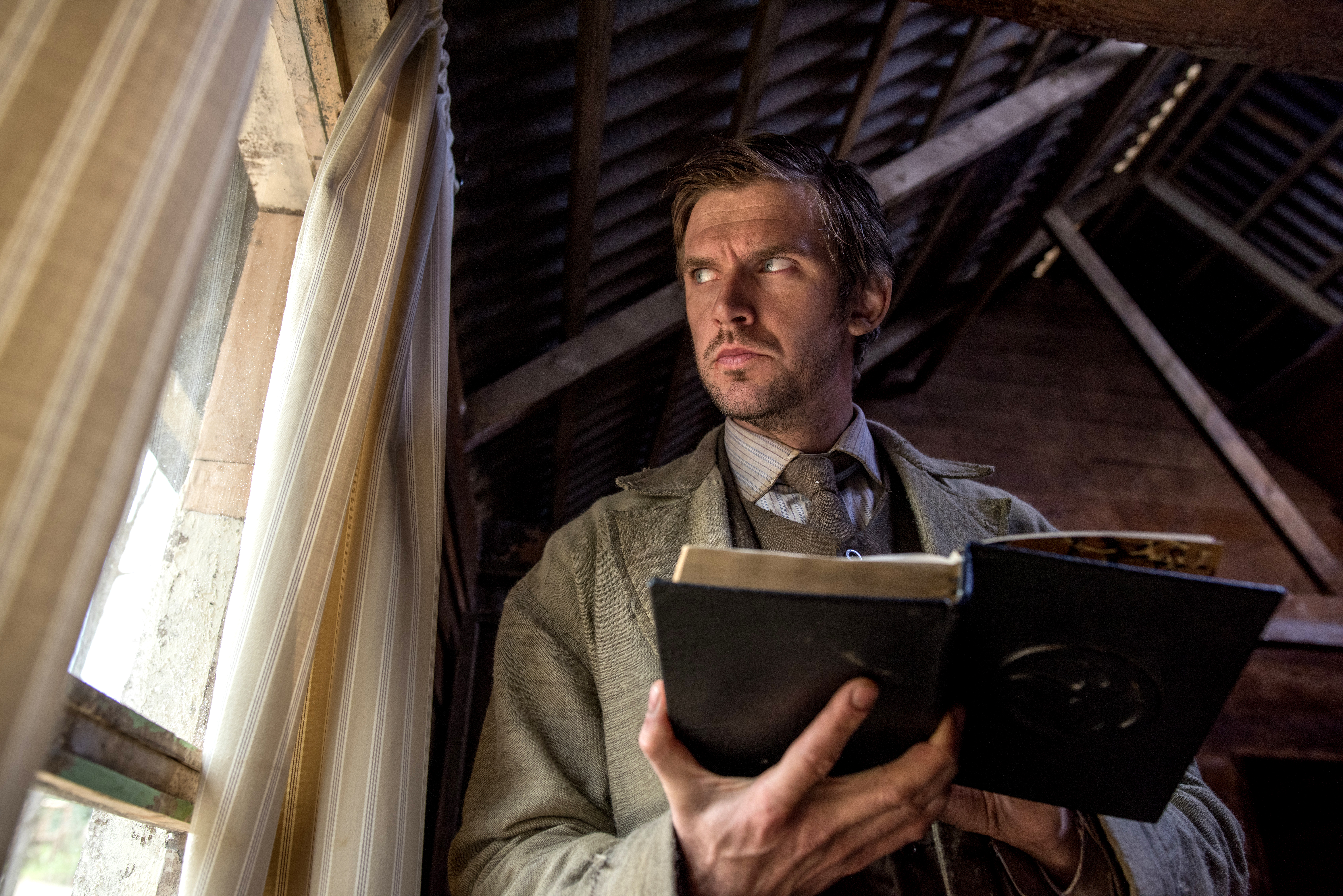How Dan Stevens got weird
If Stevens' choice in roles since leaving Downton Abbey sends any message, it's that he'd like you to think of him as more than Prince Charming


A free daily email with the biggest news stories of the day – and the best features from TheWeek.com
You are now subscribed
Your newsletter sign-up was successful
When you think of Dan Stevens, you probably think of Matthew Crawley, heir presumptive to the Grantham estate in the British TV series Downton Abbey: Polished, progressive, well-heeled, and devastatingly handsome.
You probably don't think of suicidal wrecks nursing laudanum addictions, sex-shy nebbishes, haughty narcissists, schizophrenics with incalculable psionic powers, or unstoppable killing machines. But if Stevens' choice in roles since leaving Downton Abbey in 2012 sends any message, it's that he'd like you to think of him as more than Prince Charming.
Netflix's Apostle — the new horror film from Welsh maestro Gareth Evans, out this past weekend — isn't the start of the actor's campaign to recalibrate his Downton image; it's the continuation. Stevens began his post-Abbey career trading on Crawley in movies like 2013's period drama Summer in February and 2012's horror comedy Vamps, which, while miles away from Downton Abbey's British propriety, nonetheless treats his character, the son of the legendary vampire slayer Van Helsing, as a riff on the dashing leading man. Then came 2014's The Guest, which gleefully subverts that good guy persona and set Stevens on a different path. One of his last displays of male gallantry — as Lancelot in Night at the Museum: Secret of the Tomb — was released in theaters a few months later, giving audiences a last taste of the Stevens they knew.
The Week
Escape your echo chamber. Get the facts behind the news, plus analysis from multiple perspectives.

Sign up for The Week's Free Newsletters
From our morning news briefing to a weekly Good News Newsletter, get the best of The Week delivered directly to your inbox.
From our morning news briefing to a weekly Good News Newsletter, get the best of The Week delivered directly to your inbox.
Reading too much into an actor's filmography poses a particular danger, of course; it's one thing to interpret art and another to interpret a career. Maybe Stevens doesn't mean to say anything with his post-Downton projects. But Stevens himself has colored his decision to leave the well-mannered gentry drama as precisely that — a decision. "From a personal point of view," he told The Telegraph's Sarah Crompton in 2016, "I wanted a chance to do other things."
And he did. By the time Stevens returned to playing nobility, his princeliness was hidden behind a CGI monster in 2017's Beauty and the Beast. That year also saw Stevens play Anne Hathaway's fed-up boyfriend in Colossal, an effete groom-to-be in Permission, a physicist burdened with an apocalyptic choice in Kill Switch, a blind man given sight and extreme vanity in The Ticket, and Charles Dickens in The Man Who Invented Christmas. (If you take Dickens' words and works as racist and anti-Semitic, then this film is the ultimate rejection of Crawley's egalitarianism.) And Stevens took his first leading role on television, too, playing whacked-out telepath David Haller in the super stylized and super weird Marvel show Legion. Maybe Stevens didn't have ulterior motives in picking these parts, but they speak to an actor eager to branch out, embrace new characters, and distance himself from the type his audience thinks him to be.
Which brings us back to Apostle. Stevens' character, Thomas Richardson, is about as "other" as you'll find in his work. Richardson is on a mission to save his sister from Erisden, a religious cult that's settled on a secluded isle off the English coast. He regards those around him with distrust, his voice dripping with contempt. As the story progresses, we learn why: Thomas was once a missionary, and, in the fashion of Silence, suffered the violent consequences of visiting his faith on other cultures, forced to watch his fellow missionaries murdered by unwelcoming locals as a cross is branded into his back in punishment for interloping. He's not been the same since.
Apostle is a brutal piece of work, which, if you're familiar with director Gareth Evans' aesthetic, is like describing the sun as hot; he treats his supporting characters as pieces of meat to be relieved, screaming, of their breath, whether by gun or spear or worse. Apostle is also an athletic film in terms of action and craftsmanship: The cinematography is so fleet of foot, you may forget there's a crew behind the lens. The camera is alive. But it lingers on Stevens' haunted gaze, finding in it an authentic spark of life. Stevens embraces his role in Evans' grand guignol with the gusto of an actor out to prove something, but Stevens has nothing to prove. He's simply enjoying himself.
A free daily email with the biggest news stories of the day – and the best features from TheWeek.com
And, like his forebears in the pantheon of sophisticated contemporary thespians, Stevens should. Consider Cate Blanchett, one of the great actors of our time, who, like Stevens, began her career on stage, gained international recognition for playing a character of high social standing in British society (though, in fairness, Queen Elizabeth's status is astronomically greater than Crawley's), and over the course of her career since has studiously diversified her roles to include more than what the industry decrees "prestigious"; she's not above wielding her talent in a Marvel film (2017's Thor: Ragnarok), or in screwball-ish kids' movies (The House with a Clock in Its Walls), or in the Lord of the Rings franchise. The list goes on, an Oceans 8 buttressing a Carol or a Blue Jasmine along the way.
Like Blanchett, Stevens is building his career off a sophisticated base with parts that defy expectation. Apostle may not align with your perception of Stevens' acting mien, but that's for the best: The film is another window into the actor he's wanted to be after Downton.
Bostonian culture journalist Andy Crump covers the movies, beer, music, and being a dad for way too many outlets, perhaps even yours: Paste Magazine, The Playlist, Mic, The Week, Hop Culture, and Inverse, plus others. You can follow him on Twitter and find his collected writing at his personal blog. He is composed of roughly 65 percent craft beer.
-
 The 9 best steroid-free players who should be in the Baseball Hall of Fame
The 9 best steroid-free players who should be in the Baseball Hall of Famein depth These athletes’ exploits were both real and spectacular
-
 ‘Bad Bunny’s music feels inclusive and exclusive at the same time’
‘Bad Bunny’s music feels inclusive and exclusive at the same time’Instant Opinion Opinion, comment and editorials of the day
-
 What to watch on TV this February
What to watch on TV this Februarythe week recommends An animated lawyers show, a post-apocalyptic family reunion and a revival of an early aughts comedy classic
-
 Walter Isaacson's 'Elon Musk' can 'scarcely contain its subject'
Walter Isaacson's 'Elon Musk' can 'scarcely contain its subject'The latest biography on the elusive tech mogul is causing a stir among critics
-
 Welcome to the new TheWeek.com!
Welcome to the new TheWeek.com!The Explainer Please allow us to reintroduce ourselves
-
 The Oscars finale was a heartless disaster
The Oscars finale was a heartless disasterThe Explainer A calculated attempt at emotional manipulation goes very wrong
-
 Most awkward awards show ever?
Most awkward awards show ever?The Explainer The best, worst, and most shocking moments from a chaotic Golden Globes
-
 The possible silver lining to the Warner Bros. deal
The possible silver lining to the Warner Bros. dealThe Explainer Could what's terrible for theaters be good for creators?
-
 Jeffrey Wright is the new 'narrator voice'
Jeffrey Wright is the new 'narrator voice'The Explainer Move over, Sam Elliott and Morgan Freeman
-
 This week's literary events are the biggest award shows of 2020
This week's literary events are the biggest award shows of 2020feature So long, Oscar. Hello, Booker.
-
 What She Dies Tomorrow can teach us about our unshakable obsession with mortality
What She Dies Tomorrow can teach us about our unshakable obsession with mortalityThe Explainer This film isn't about the pandemic. But it can help viewers confront their fears about death.
